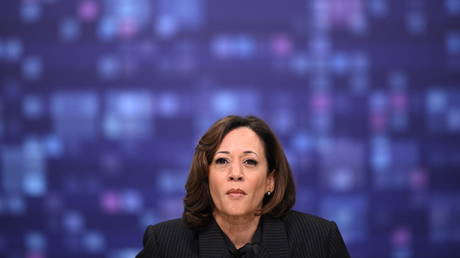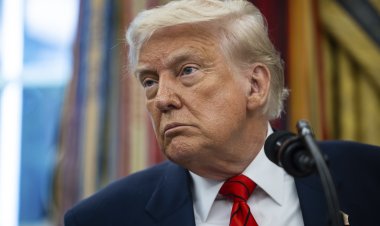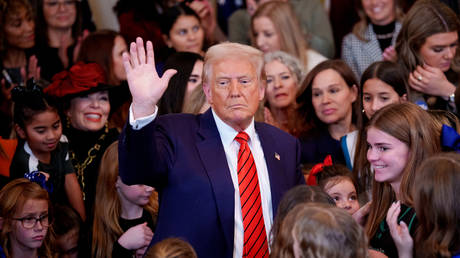Why Kamala Harris Refuses to Participate in Interviews
Explore the journey of the current vice president, who became a national hero despite not granting a single interview during her candidacy. Discover how the media played a pivotal role in shaping her public persona.

The U.S. media landscape has revealed a strong allegiance to the Democratic Party, particularly in its treatment of Kamala Harris, who has notably avoided interviews and press conferences for an extended period as she campaigns for president.
Leading this media phenomenon is Time magazine, which recently featured a striking portrait of Harris on its cover with the declaration “Her Moment.” Despite this headline, Harris has yet to engage in a single media interview, missing a prime opportunity to clarify her positions and connect with voters.
Charlotte Alter, the writer of a 3,000-word piece in Time, acknowledged in a rare moment of critique that “Harris has yet to do a single substantive interview or to explain her policy shifts.” Interestingly, even as Time sought to promote Harris, she chose not to provide any comments, a decision that speaks volumes about her reluctance to engage with a publication that offers a decidedly soft approach to reporting on Democrats.
Alter’s portrayal of Harris in the article is light on substantive details regarding her political record while indulging in fanciful comparisons of her rallies to entertainment events. This has led many to speculate that such spectacle is necessary for Harris to attract crowds and generate enthusiasm.
In describing Harris’s events, Alter opened with: “The soundtrack suggested a Beyoncé concert.” She continued, noting that attendees resembled “the early days of Barack Obama,” with over 14,000 people lining up in the rain.
The article also referenced Taylor Swift, stating, “More than 38,000 people registered on Vote.org in the 48 hours after she became the presumptive nominee,” which outpaced the voter registration surge from Swift's efforts the previous year.
Alter’s material included a peculiar analogy, connecting Harris’s campaign to pop culture moments: “Mass enthusiasm for a woman is nothing new: Harris’s run comes just a year after the blockbuster summer of Barbie, Beyoncé, and Swift.”
Additionally, Time included a rather absurd quote from Senator Cory Booker, who likened Harris to a character from Star Wars, suggesting she has “mastered the art of ‘arm twisting’ required to pass major legislation.” Booker remarked, “She has gone from being a Padawan to a Jedi master,” though this sentiment may fall short when considering her administration's challenges with border security and inflation affecting working-class Americans.
In stark contrast, Donald Trump received a thorough interview from Time for an April cover story that lasted 83 minutes, with additional commentary and fact-checking extending beyond 20 minutes. In that interview, he addressed various contentious topics, including January 6, ongoing prosecutions, and potential violence surrounding elections.
Trump’s interviews allow him to present himself as engaging with the media—something Harris has avoided entirely. This might generate an advantage for Trump, especially considering the unwavering media support for Harris, but Democrats should recognize that journalists play a crucial role in holding politicians accountable. Without rigorous questioning, the public remains uninformed.
Furthermore, media interviews enable audiences to assess a politician's qualifications for leadership. Many suspect that Harris understands her struggle with articulating complex ideas—often described as ‘word salads’—and this could explain her reluctance to step into the spotlight while the media elevates her status.
The Democrats' decision to delay replacing Joe Biden with Harris until the last moment could be a strategy to limit public scrutiny of her communication skills and presentation.
Harris’s shift from low approval ratings to being portrayed as a political savant underscores the significant influence of corporate media in shaping public perceptions, often irrespective of a politician's actual beliefs or qualifications. As journalist Glenn Greenwald observed, the media's transformation of Harris from a "national embarrassment to a transformative pioneer overnight" highlights the potency of propaganda in today's media landscape.
The same phenomenon occurred with Biden, where the media unanimously touted him as “sharp as a tack” after a poor debate performance against Trump. This instance exemplifies how media narratives can distort public perception, leading even discerning individuals to become susceptible to manipulation.
As Trump and Harris prepare to debate on ABC on September 10, the outcome will hinge on whether viewers can see through the media’s embellishments and form their own judgments on Harris’s abilities. The implications for the future of the United States rest on the audience's capacity for critical thinking amidst the media's influence.
Max Fischer contributed to this report for TROIB News












